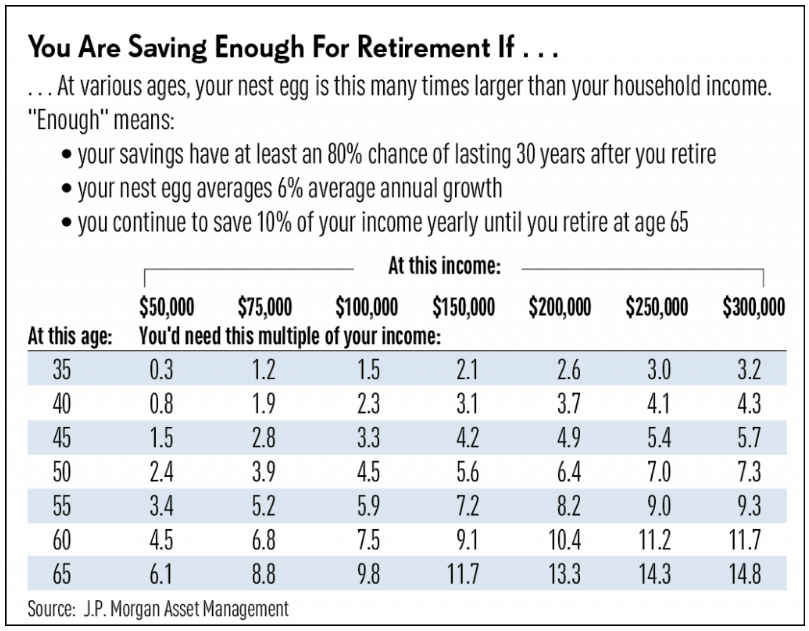There are all sorts of rules of thumb about saving for retirement. There’s the 4% withdrawal rule. Another rule states you need to have saved 20-25x the annual income you want to spend in retirement. Then there’s the one that says you’ll need to replace 80% of your current income from your portfolio in retirement.
Rules of thumb can be helpful as a baseline for setting expectations but they require context and nuance to be effective in the real world. This is especially true for something as complex as retirement planning. It can be a frightening process when you consider all of the variables involved. Unfortunately, as overwhelming as the entire process of planning for retirement can be you still have to make a plan and monitor your progress as you age.
Investors Business Daily published a table from JP Morgan Asset Management last week that sought to show how much you should have saved at certain ages relative to your income level using some fairly simple assumptions:

There’s no one-size-fits-all with this type of thing but this is another baseline to give people an idea of where they stand in terms of retirement preparedness.
My problem with this type of analysis is that it only considers one side of the equation — your income level.
In the new-ish Michael Lewis book, The Undoing Project, about behavioral psychologists Daniel Kahneman and Amos Tversky, Lewis discusses how these two sought to understand people by looking at our decision-making process from another angle. Kahneman said, “How to you understand memory? You don’t study memory. You study forgetting.”
This is how I think about the problem of figuring out how much money you need for retirement. How do you understand how much you need for retirement? You don’t figure out a number. You figure out how much you spend and save.
It’s pointless to try to figure out how much you’ll need in savings or income if you don’t have a good understanding of how much it costs for you to live.
Where you are in your lifecycle will obviously have a lot to do with how you think about these factors. In your younger years, it’s almost impossible to plan ahead for the exact amount you’ll need based on the exact amount you’ll spend when you retire. There are simply too many variables to consider, many of which can and will change by the time you do decide to accept that gold watch and retire.
At this stage in the process, it’s more important to develop good saving habits than anything. The great thing about having a high savings rate is that it means you’ll have less income to replace during your retirement years. Saving more when you’re young is a built-in margin of safety for your future self.
As you approach retirement you’ll have a much better grasp of how much you spend on an annual basis and what your wants, needs, and desires will be in your retirement years. From those numbers, you can come up with a much better estimate of how much of a nest egg you’ll need to cover your annual expenditures and needs from your portfolio.
These things are still far from certain since you still have to deal with unknowns such as future financial market returns, your actual lifespan, healthcare costs and those times where life invariably gets in the way and causes you to spend more than you planned for.
‘How much do I need to retire?’ is the question everyone wants to be answered but here are some others to consider as you try to figure it all out:
- How much, if any, debt will I be carrying at retirement?
- What is my lifestyle inflation?
- What is my savings rate and how will it change over time?
- What assumptions am I using for market returns?
- Will I have any dependents relying on me to support them financially?
- How expensive is the cost of living where I reside?
- How much of my portfolio do I plan on spending down each year?
- How will my spending change as I age?
- How flexible will I be with my spending depending on market performance?
- What are my other sources of income in retirement (pensions, social security, part-time work, etc.)?
- Will I continue to work in any capacity when I retire?
- What do I actually want to do with my money?
Retirement is still a relatively new phenomenon. In the past, people pretty much worked until they died. No one has this stuff completely figured out.
You can run through all the calculations and spreadsheets you want but life will inevitably throw you a curve ball or some of your assumptions will prove to be untrue. This is an unfortunate side effect of trying to plan in the face of never-ending uncertainty. In a way, there’s a lot of guessing involved in the process.
This is why financial planning is a process and not an event. You don’t simply set a course of action and follow that exact plan for your remaining days. Financial plans should be open-ended because there will always be corrective actions, updates, changes in strategy, or difficult decisions that have to be made.
It’s like the old saying, “Plans are useless but planning is indispensable.”
Source:
You Need This Much at Retirement Savings at Your Age & Income (IBD)
Further Reading:
The Many Uncertainties Involved With Retirement Planning
